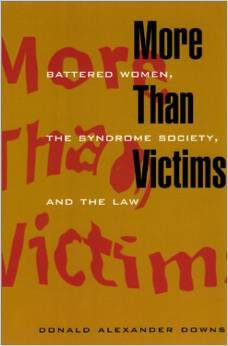More Than Victims: Battered Women Syndrome, Society, and the Law Order
Legal gadfly Alan Dershowitz called them “abuse excuses” in last year’s The Abuse Excuse in which he railed against the burgeoning use of criminal self-defenses such as battered-child syndrome and battered-woman syndrome. Downs, a political scientist, doesn’t rant. Instead, he considers the ability of these defenses to increase society’s awareness of the special fears of individuals “subjected to violence and related forms of abuse on a sustained basis.” But he also discusses their failings, focusing primarily on battered-woman syndrome. Relying on a BWS defense, he argues repeatedly, signals an incapacity to employ reason and take responsibility. And when one is officially labeled incapable of being responsible in one context, an individual may “surrender the benefits that accrue to bearing responsibility in another context.” Women found to have been afflicted by BWS have fared badly in child custody hearings, he notes. Based on interviews with battered women, experts in the field and prodigious research, Downs concludes that BWS-based defenses are unable to help women who kill in nonconfrontational situations. He suggests reforming the key standards, such as a more flexible standard for imminence along the lines of that used for kidnapping cases, in the law of self-defense. This reasonably accessible work takes the reader through a careful analysis of various syndromes, a legal critique of BWS, and examines the syndrome society from the vantage of political theory and citizenship.




